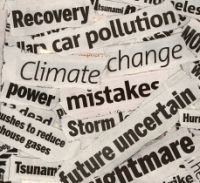

A report compiled by the Intergovernmental Panel on Climate Change (IPCC) has warned that the impacts of global warming are likely to be "severe, pervasive and irreversible". These impacts include a higher risk of flooding and changes to crop yields and water availability.
Although the natural world has so far been taking the main assault from climate change, there is a growing worry as to how humans will be impacted. The summary of the report claims that rising temperatures will impact on human health, homes, food and safety.
Dr Saleemul Huq, a convening lead author on one of the chapters in the report, said, "Before this we thought we knew this was happening, but now we have overwhelming evidence that it is happening and it is real."
This report was based on over 12,000 peer-reviewed scientific studies and, according to Michel Jarraud, secretary-general of the World Meteorological Organization, is "the most solid evidence you can get in any scientific discipline."
Ed Davey, the UK Energy and Climate Secretary, said, "The science has clearly spoken. Left unchecked, climate change will impact on many aspects of our society, with far reaching consequences to human health, global food security and economic development. The recent flooding in the UK is a testament to the devastation that climate change could bring to our daily lives."
In addition, US Secretary of State John Kerry has acknowledged that "Unless we act dramatically and quickly, science tells us our climate and our way of life are literally in jeopardy. Denial of the science is malpractice."
The impacts of global warming specified in the report include: threats to Arctic sea ice and coral reefs, acidification of the ocean and a resulting threat to sea-life, reduced food security as crop yields decrease and an increased risk of flooding and also heat mortality. However, the impacts are not just physical. On a geo-political level we could see an increase in migration as well as an increase in conflict.
However, it is not all doom and gloom. As Dr Chris Field, chair of the report, said, "I think the really big breakthrough in this report is the new idea of thinking about managing climate change as a problem in managing risks." Dr Field added, "Climate change is really important but we have a lot of the tools for dealing effectively with it - we just need to be smart about it."
For further information, see the: